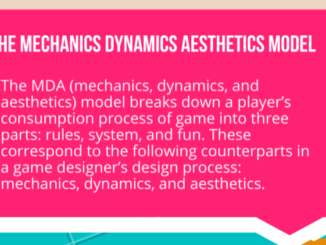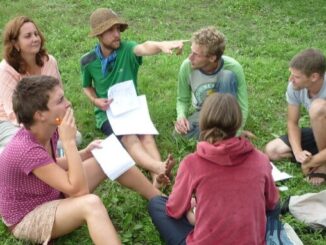
Lately, games have been used as inspiration for myriads of innovations, implementations, and beneficial missions in all areas of our lives, as never before.
Gamification, for example, taps into games with the purpose of positively influence various parameters of the environment it has been implemented to.
Serious games are created for education, awareness increase of often vital topics, solving challenges that otherwise were not solved, and other higher purposes.
And Self-Gamification is turning our projects, activities, and our whole lives into fun games, of which we are both the designers and the players.
But why is that? What motivates us to call games for help to increase the quality of experience in other areas of our lives?
Before I answer, I need to mention that the term I am going to use as the answer has been seen as controversial in the gamification and also game design community, because it is hard or often impossible to detect or measure in other people.
And I am aware that this position might open a heated discussion.
But here it is.
I think the biggest reason for so many people to go to games as inspiration is the experience of FUN.
When talking about fun, I love quoting Heidi Klum, a German-American supermodel and television personality, who had been one of the four judges on America’s Got Talent (AGT) for many years.
After the results show of the AGT 2017 finals, a reporter asked Heidi what advice she would give to the winner, Darcy Lynn, a twelve-year-old ventriloquist. Without hesitating, Heidi answered,
“Always to have fun. If you don’t have fun, it shows in your performance. That is always the key number one.”
I can’t stop wondering why fun is often forgotten and underestimated, although it is truly one of the prerequisites and indicators for success — both having and not having fun, show.
It is especially visible in the entertainment industry. But also, in other areas, including the most technical and business ones, the experience of fun sets you on the path toward success. Many quotes in both business and self-help literature confirm this.
“Fun is an extraordinarily valuable tool to address serious business pursuits like marketing, productivity enhancement, innovation, customer engagement, human resources, and sustainability.” — Kevin Werbach and Dan Hunter, For the Win
Here is another brilliant thought about fun, which I already quoted earlier, but which is worth remembering every once in a while. It is one of my favourite quotes by my favourite authors on living in the moment, Ariel and Shya Kane:
“We have come to realize if we are not having fun, we are moving in the wrong direction.”
But how to find this “right” direction? What is fun anyway?
Fun is a complex term made up of just three letters.
What is fun for us might not be fun for someone else. What we find fun is not only subjective to various persons but even to the same person in different circumstances. We might enjoy playing a game one day and not so much on another.
But there is a great thing about fun. However difficult it is to define in words (I counted, for example, more than ten definitions of fun in just a few chapters of the acclaimed book Theory of Fun for Game Design by Raph Koster), we all know what it feels like for us.
Fun can show in different ways. One time while we have fun and enjoy something, we might laugh, and at other times, while fully engaged in a video game or fantasy novel, we might frown and appear quite tense. But we are still having fun!
There is another excellent feature of fun. You can discover it anywhere and in anything. Even in those activities, you initially claim not to be fun.
We can discover fun when we give that project or activity a chance, approach it with curiosity and without prejudice while being open to recognizing the fun factors in there, or we can bring fun elements into the project deliberately. Or all of these together.
How can we do this?
Curiosity and passion can help us here. I call them the siblings of fun in this inspirational trio, one preceding and the other succeeding the birth of fun in each moment. These triplets helped us, humans, to choose and pave previously unfathomable paths.
Here is one of my favourite stories on how curiosity leads to passion and fantastic success:
“I was in the cafeteria and some guy, fooling around, throws a plate in the air. As the plate went up in the air I saw it wobble, and I noticed the red medallion of Cornell on the plate going around. It was pretty obvious to me that the medallion went around faster than the wobbling. I had nothing to do, so I start figuring out the motion of the rotating plate. I discovered that when the angle is very slight, the medallion rotates twice as fast as the wobble rate—two to one. It came out of a complicated equation! I went on to work out equations for wobbles. Then I thought about how the electron orbits start to move in relativity. Then there’s the Dirac equation in electrodynamics. And then quantum electrodynamics. And before I knew it… the whole business that I got the Nobel prize for came from that piddling around with the wobbling plate.”
— Richard P. Feynman, Surely You’re Joking, Mr. Feynman!
Fun has also led me to initially unexpected but utterly rewarding places. I wouldn’t have become an author if I hadn’t let myself “taste” writing out of curiosity, and let myself follow what felt healing, rewarding, rejuvenating, but most of all, fun for me. I have tried various art forms in my life, including singing, playing guitar, painting, making jewellery, and decorations. But it was writing that turned out to be the best way to express myself.
Through all those experiences, I discovered that fun equalled wholehearted and rewarding engagement. And that is precisely what defines successful projects and those involved in them. The latter are wholeheartedly engaged, and experience this engagement as utterly satisfying.
But where does fun bring us? What is the ultimate goal of bringing game design and other fun elements into other areas of our lives?
I think this definition of games by Yu-kai Chou gives a clue:
“Games have no other purpose than to please the humans playing them. Yes, there are often ‘objectives’ in games, such as killing a dragon or saving the princess. But those are all excuses to simply keep the player happily entertained inside the system, further engaging them enough to stay committed to the game.”
— Yu-kai Chou, Actionable Gamification
This happy entertainment is what ultimately drives us when we bring fun elements into whatever area of our lives. It is no longer a secret that we humans carry our moods from one area of our lives to the other. So, some genius people in many centuries of the history of humanity recognized that not only the bad mood is infectious, but the positive and gameful mood too.
So, what we all in the gameful and playful industries are doing is not only to make other areas of life successful but also entertaining and fun.
[A note: This article contains original content mixed with parts for three books on Self-Gamification: Self-Gamification Happiness Formula, Gameful Project Management, and The Who, What, When, Where, Why & How of Turning Life into Fun Games.]
- The Collaborative-Competitive Paradox of Self-Gamification - 14th January 2022
- Self-Gamification and the Core Gameplay Loops - 21st August 2020
- What playing games and turning life into games can teach us? - 17th April 2020





I love the concept of ‘happy entertainment’. It is what we are all striving for all the time, which is why your approach makes so much sense.In my opinion it is not just a good idea, but a responsibility, to inject as much fun as we can into our lives, because it is that ‘fun’ that means we are happy and healthy as we move through life.